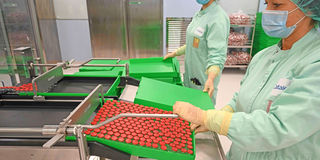Sharing is caring, countries told on Covid-19 vaccines

Laboratory technicians handle vials ahead of the large-scale production and supply of the University of Oxford’s Covid-19 vaccine candidate.
The world must collaborate on key innovation projects if the Covid-19 pandemic is to be tamed on a global scale, a new report recommends.
The 2020 Goalkeepers Report by the Bill and Melinda Gates Foundation warns that if developed economies use technology to contain the pandemic for their own benefit, more deaths from the virus in developing countries will be witnessed.
As world waits for a vaccine, the research has found that if rich countries buy up the first two billion doses of vaccine instead of making sure they are distributed equitably, then almost twice as many people could die from the virus.
However, the study hails innovation projects in third world nations, saying it is a great step towards efforts to contain the virus, at a time when a second wave of infections looms in Europe.
“Despite these constraints, countries have been innovative, with more candidates for vaccines being witnessed and therapeutics being developed faster than ever,” said the report.
Pandemic-focused innovations include contact tracing in Vietnam and pooled testing in Ghana, while new or improved digital cash transfer programmes are reaching 1.1 billion people in 138 countries.”
Best of humanity
“The Africa Centres for Disease Control and Prevention, the UN Economic Commission for Africa, the African ExportImport Bank, and dozens of other partners launched the African Digital Medical Supplies Platform to ensure that countries on the continent have access to affordable, high-quality, lifesaving equipment and supplies, many of which are manufactured in Africa,” the survey exemplifies.
The foundation calls on the world to collaborate on the development of technologies and innovations for diagnostics, vaccines, and treatment; manufacture tests and doses as quickly as possible; and deliver these tools equitably based on need rather than the ability to pay.
“The response to the Covid-19 pandemic has shown us some of the best of humanity: ground breaking innovation, heroic acts by frontline workers, and ordinary people doing the best they can for their families, neighbours, and communities,” it says. “This is a shared global crisis that demands a shared global response.”



